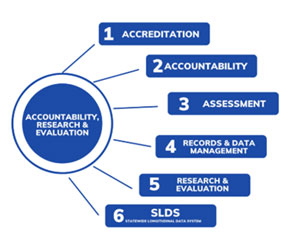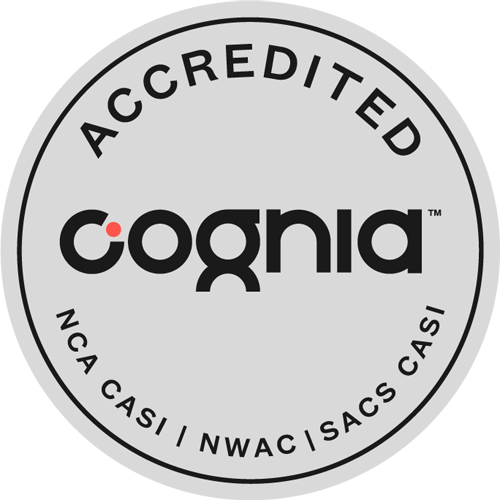The mission of the Office of Accountability, Research & Evaluation is to support and enhance the quality of data-driven decisions by providing services and information to all stakeholders through an effectively managed system aligned to the CNMI PSS Strategic Priorities and to ensure continuous improvement at the school and district level.
The Office of Accountability, Research & Evaluation consists of six (6) programs:

The Office of Accountability, Research, and Evaluation, also known as ARE, serves as the clearinghouse for the Public School System’s data and records under the Records and Data Management Office, oversees the school, program and district-wide accountability under the Accountability office, approves research and conducts program evaluation under the Research and Evaluation Office, compiles and reports on comprehensive student academic achievement under the Assessment Office, facilitates the school and district-wide accreditation under the Accreditation Office, and builds shared tools, resources, and practices—rooted in local needs and proven approaches—to help address common data challenges across the P20W (Preschool through Grade 20 and Workforce) pipeline.
Our office is located at #1258 Pohnpei Way Rte 312 Capitol Hill
You may reach our office by phone at (670) 256-5310

The Office of Accountability, Research, and Evaluation, also known as ARE, serves as the clearinghouse for the Public School System’s data and records under the Records and Data Management Office, oversees the school, program and district-wide accountability under the Accountability office, approves research and conducts program evaluation under the Research and Evaluation Office, compiles and reports on comprehensive student academic achievement under the Assessment Office, facilitates the school and district-wide accreditation under the Accreditation Office, and builds shared tools, resources, and practices—rooted in local needs and proven approaches—to help address common data challenges across the P20W (Preschool through Grade 20 and Workforce) pipeline.
Our office is located at #1258 Pohnpei Way Rte 312 Capitol Hill
You may reach our office by phone at (670) 256-5310
Senior Director:
Dr. Yvonne Pangelinan
Administrative Assistant:
Ezra Rabauliman
Accountability/Accreditation Program Manager:
Celine Orsini
Assessment Program Manager:
Fasefulu Tigilau
Statistical Analyst:
Probio Cabrera
Data & Records:
Josiah Kyonka
Data Specialist/BI Analyst:
Louie Dean Bautista
Dr. Yvonne Pangelinan
Administrative Assistant:
Ezra Rabauliman
Accountability/Accreditation Program Manager:
Celine Orsini
Assessment Program Manager:
Fasefulu Tigilau
Statistical Analyst:
Probio Cabrera
Data & Records:
Josiah Kyonka
Data Specialist/BI Analyst:
Louie Dean Bautista
Records & Data Program Manager:
Ruth Calvo
Research & Evaluation Manager:
Femie Rey
SLDS Program Director:
Dr. Annette Pladevega-Sablan
SLDS Technical Manager:
Jeaniffer Cubangbang
Data Privacy Security Officer:
Ferdinand Ngirmekur
Data Governance Program Manager:
Geralyn DelaCruz
Ruth Calvo
Research & Evaluation Manager:
Femie Rey
SLDS Program Director:
Dr. Annette Pladevega-Sablan
SLDS Technical Manager:
Jeaniffer Cubangbang
Data Privacy Security Officer:
Ferdinand Ngirmekur
Data Governance Program Manager:
Geralyn DelaCruz
The Accountability Office aims to measure the growth in the quality of the schools in the CNMI Public School System by producing timely and reliable accountability determinations as required by state and federal law. The office seeks to support schools and other stakeholders by helping to ensure that our students graduate college and career ready; that we engage in meaningful work with our community partners; that we use data to inform educational improvements in the classroom, school, and board-level; and that we support schools in closing the achievement gaps between and among all student subgroups.
The Commonwealth of the Northern Marianas Public School System Assessment Program oversees the Comprehensive Student Accountability Plan. This was approved by the State Board of Education in 1999 which requires multiple assessments in accordance with the State Board Policy. The Comprehensive Student Accountability Plan was developed for the purpose of determining what students know and what students are able to do based on multiple modes of assessments.
The Commonwealth of the Northern Marianas Public School System Assessment Program oversees the Comprehensive Student Accountability Plan. This was approved by the State Board of Education in 1999 which requires multiple assessments in accordance with the State Board Policy. The Comprehensive Student Accountability Plan was developed for the purpose of determining what students know and what students are able to do based on multiple modes of assessments.
The Assessment Program is supported through the consolidated grant received from the Federal government. The Assessment Program provides technical assistance and support to the schools in the areas of professional development on classroom assessments, technical support on academic data collection and analysis, technical support on student academic achievement data and instructional implications, annual reports on student academic achievement as measured by STAR and Standards-Based Assessment.
Cognia, formerly known as AdvancED, is the accrediting body for the Public School System. “AdvancED was formed through a 2006 merger of Pre-K-12 divisions of the North Central Association Commission on Accreditation and School Improvement (NCA CASI), Southern Association of Colleges and Schools Council on Accreditation and School Improvement (SACS CASI) and has expanded through the addition of the Northwest Accreditation Commission (NWAC) in 2012.”
The Public School System’s initial accreditation was granted a five-year term in 2014. In October 2018, an External Review of the District’s performance process to renew accreditation standing for another five years is scheduled.
The Accreditation Program collaborates with all Schools, Programs, and Early Learning to ensure the District’s Strategic Priorities are met and aligned with Accreditation Standards to increase student learning, sound leadership, and efficient resources as outlined in the School-Wide Improvement Plans (SWP).
The Public School System’s initial accreditation was granted a five-year term in 2014. In October 2018, an External Review of the District’s performance process to renew accreditation standing for another five years is scheduled.
The Accreditation Program collaborates with all Schools, Programs, and Early Learning to ensure the District’s Strategic Priorities are met and aligned with Accreditation Standards to increase student learning, sound leadership, and efficient resources as outlined in the School-Wide Improvement Plans (SWP).
Research & Evaluation plays an integral part in supporting research requests that benefit the educational institution by providing approval, resources and the infrastructure needed to ensure high quality research is conducted effectively and safely. Evaluating the effectiveness and quality of educational programs ensures that district initiatives are achieving their intended outcomes and complying with local and federal regulations. Research & Evaluation facilitate the development and compliance of Schoolwide Improvement Plans. These plans are strategic frameworks developed by schools to enhance academic achievement, improve student outcomes and address critical areas of improvement. R&E helps ensure that these plans are data-driven, align with district strategic initiatives and are continually monitored for effectiveness.
The Office of Records and Data Management plays a critical role in overseeing the systematic collection, storage, organization, and retrieval of data and records within an organization. This office ensures that all records—whether electronic, physical, or both—are handled in a way that supports confidentiality, privacy, integrity, compliance, transparency, and operational efficiency.
The Statewide Longitudinal Data System (SLDS) is a federally funded initiative that helps CNMI educators, agencies, and families use data to make informed decisions. We build shared tools, resources, and practices—rooted in local needs and proven approaches—to help address common data challenges across the P20W (Preschool through Grade 20 and Workforce) pipeline.





